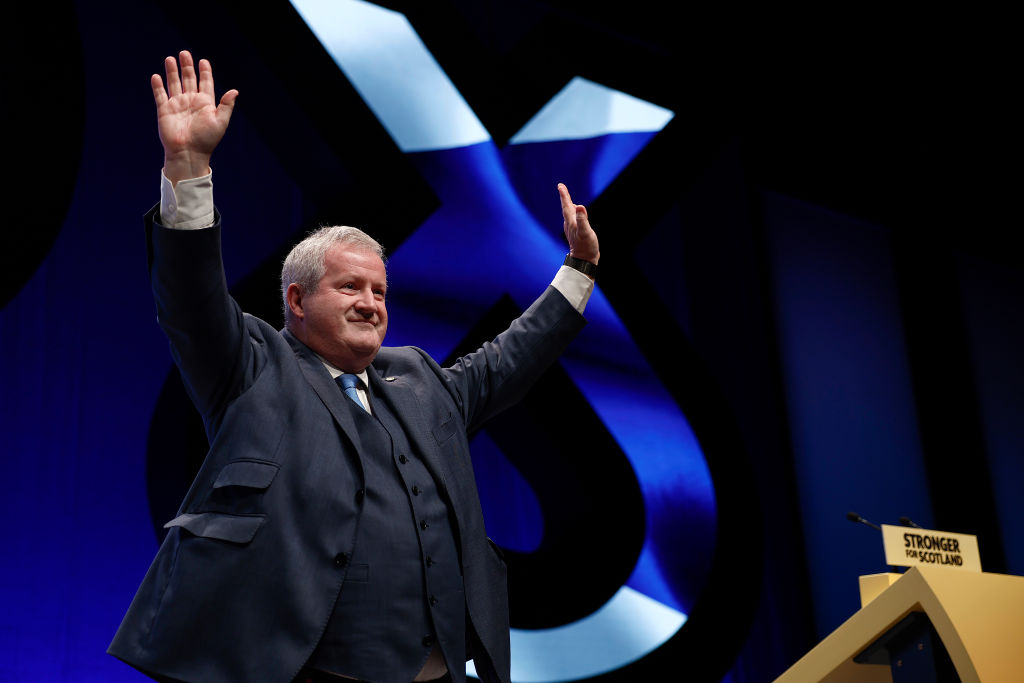Ian Blackford, the SNP MP, is to stand down at the next election. And last night he gave an interview to Anand Menon of the think-tank UK In a Changing Europe. The mood was cosy, the questions as soft as marshmallows. Menon opened with the issue of independence and he allowed Blackford to change the subject from ‘process’ to ‘the kind of country Scotland will be’.
Blackford stated correctly that Scotland’s status as England’s poorer neighbour encourages the best and brightest Scots to move south. And he quoted a statistic suggesting that England has benefited from Scottish inward migration in every decade since the 1850s. He outlined a solution that was strong on slogans, weak on detail. ‘We’ve got a plan to grow the Scottish economy… by developing Scotland as a destination for talent to come to.’ The engine of reform will be the country’s ‘world-leading universities’ where ‘disruptors’ will develop ‘start-ups and spin-offs at scale.’ It sounded like a California pipe-dream. And he airily announced that 325,000 jobs might be created in the wind and solar industries, ‘dwarfing oil and gas,’ but he didn’t say what this magical new workforce would do. He argued the ‘the first minister should have an industrial council in his office.’ Clearly he believes that the state itself is the most dynamic and talented entrepreneur imaginable. Real innovators tend to believe the opposite.
Menon overlooked the knotty issues of defence, sterling, or the constitutional status of the crown in an independent Scotland and instead he asked how easy it would be for Scotland to rejoin the EU.
‘As part of the United Kingdom… we were a member,’ said Blackford, ‘and we still have that broad alignment [with the EU]… that will assist in our re-application to join.’
Asked about a hard border, he cited the Windsor Framework as a starting point for negotiation.
‘With goodwill on both sides we can find a way through.’
Goodwill is a sentiment not often associated with Blackford. And he revealed a possible source of his persistent Anglophobia. His weekly commute. The journey to Westminster from his Skye constituency begins with a 145-mile drive to Inverness airport and causes him to lose two days every week. No wonder he wants the seat of power in Scotland shifted from London to Edinburgh. His journey-time would be halved.
As SNP leader in Westminster he was allotted two questions at PMQs on Wednesdays, and he said he regretted that ‘so much of the week went into preparation for that.’ The first planning meeting began early on Tuesday and there was a follow-up meeting on Wednesday morning as well.
‘You need to be relevant. So as a leader of the third party perhaps you need to be a bit edgy,’ he said. But his performances at PMQs met neither of these objectives. He rarely put questions to the prime minister because he preferred to make garrulous speeches about international affairs (Syria, Afghanistan, the Balkans) that seemed far removed from the interests of his Skye constituents. When not posing as a world statesman, he liked to complain about the stinginess of England and its policy of expropriating Scotland’s assets while leaving the Scots in grinding poverty. Cumulatively, his contributions seemed like a sustained attempt to libel his countrymen and to paint them as helpless, shivering ingrates desperate to cadge yet more freebies from their colonial oppressors. Instead of advancing the cause of Scotland he merely fortified the glib caricature of the Scots as a gang of cheerless and vengeful curmudgeons.
Menon brought up Boris Johnson and Blackford reeled off a list of tart putdowns.
‘A complete liar and a charlatan… The man has done so much damage to these islands and actually so much damage to our political discourse.’
And he boasted that he almost got thrown out of the Commons for calling Boris a liar. ‘I basically called Boris a racist … and gave the Speaker examples of his language.’ By comparison he admired Theresa May: ‘A very decent person and she understood the role of opposition parties.’
Blackford evidently rates his fellow politicians according to their willingness to treat him as a world statesman
This took us to the nub of the matter. During a major crisis, like the nerve agent attacks in Salisbury in 2018, May would invite the leaders of the opposition parties to ‘meet with the National Security Adviser on Privy Council terms so that we could prepare ourselves.’ Blackford was free to ask as many questions as he wished. But when Boris became PM the meetings were truncated and the opposition leaders were permitted ‘one question each.’ This affront cemented Blackford’s undying hostility to Boris.
He stated his admiration for the Defence Secretary, Ben Wallace, whose handling of Ukraine fed Blackford’s desire to be seen as a master of international relations. He was invited to security briefings alongside ‘Keir Starmer and Ed Davey on a bi-weekly basis getting briefings as to what was going on in Ukraine.’
Blackford evidently rates his fellow politicians according to their willingness to treat him as a world statesman. A true world statesman might take a more elevated view.
What will he do outside parliament?
‘There’s life in the old dog yet,’ he said.







Comments